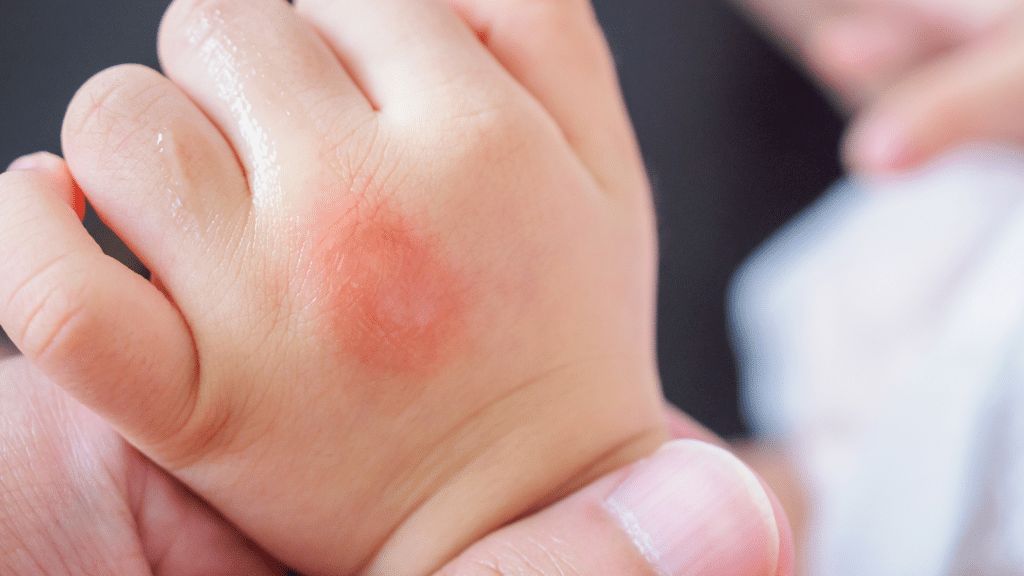Welcome to our comprehensive guide on maintaining healthy baby skin: Essential Skincare Tips. As parents or caregivers, we all adore the softness and fragility of a newborn’s skin and want to do our utmost to maintain that delicate health and softness. However, caring for a baby’s skin can often feel somewhat overwhelming, especially with all the contradictory advice. We must base our care routine on substantiated knowledge regarding what makes babies’ skin fundamentally unique and how we can meet its specific needs.
In this blog, we will take a step-by-step journey through the distinctive features and needs of babies’ skin, encounter everyday skincare routines, and delve into identifying and managing common skin conditions. This comprehensive guide is a primer for new parents to navigate the remarkable journey of ensuring their little one’s skin remains healthy, soft, and nourished. With this knowledge, parents can feel confident handling their baby’s skincare routine.

The Basics of Baby Skin
Before diving into any specific skincare tips, it’s crucial to grasp the distinctive features of a baby’s delicate skin compared to adult skin. This will aid in understanding why particular care is necessary for maintaining its health and softness.
Babies are born with remarkably soft, delicate, and sensitive skin. This is because while in utero, infants have a protective coating called vernix, which keeps their infant skin hydrated and guarded against the amniotic fluid. Babies’ skin is about 30% thinner than adults’, which makes it more susceptible to irritation, dryness, and absorption of harmful substances.
Adult skin, on the other hand, is thicker, more resilient, and already adapted to external environmental factors. It has a more developed protective barrier, making it less prone to irritation and dryness. Adults do not typically require the same amount of skincare attention as babies because their skin is more effective in maintaining health.
Now that we have a basic understanding of why baby’s delicate skin is fundamentally different let’s cover the unique needs that this delicate dermis has. Baby’s skin, being so thin and sensitive, loses moisture quickly, leading to dryness and irritation. In other words, adequate hydration is the key, and this is achieved not just by externally applying lotions and creams but also by ensuring that the baby is well-nourished and hydrated from within.
Moreover, the baby’s underdeveloped skin barrier makes it vulnerable to external irritants, including harsh fabrics, chemicals in skincare products, and even the inevitable dirty diaper. Therefore, our role is to guard this barrier and prevent potential irritants that could disrupt its development. Given that the skin is a possible avenue for harmful substances to enter a baby’s body, utmost vigilance should be observed in choosing skincare products free from harsh chemicals for the infant’s skin.
Understanding the basics of a baby’s delicate skin and its unique needs is the initial step in formulating the most suitable skincare regimen. With this knowledge, we can now confidently discuss everyday skincare routines, tackling common skin conditions and offering practical advice to nurture the baby’s skin health.

Common Newborn Skin Conditions
Newborns, despite having seemingly perfect skin, often experience certain skin conditions in their initial months. Some of the common conditions affecting a baby’s skin barrier include baby acne, diaper rash, and eczema.
Baby Acne
Babies, much like teenagers and adults, can also develop acne. Baby acne usually appears as red or white bumps on the face, especially the cheeks, nose, and forehead. Believed to be related to hormonal transfer from the mother during late pregnancy, it usually disappears on its own within a few weeks or months without requiring treatment.
Diaper Rash
Diaper rash, a common issue leading to sore, red, scaly and tender skin, often results from skin irritation due to too tight diapers, wearing wet diapers for too long, or reaction to specific brands of diapers, wipes, or laundry detergents. Applying zinc oxide cream or ointment, prompt diaper changes, and air-drying the baby’s bottom thoroughly can typically treat diaper rash.
Eczema
Eczema, also known as atopic dermatitis, commonly affects babies, appearing as red or dry skin patches and often causing itchiness. The exact cause isn’t known but is connected to genetic and environmental factors. Regular moisturizing and avoiding triggers like heat or harsh soaps can help manage eczema, although consultation with a healthcare provider is advisable if your baby has eczema.
Recognizing these common conditions affecting the baby’s skin barrier enables swift and effective treatment. Still, if your baby’s symptoms remain unresponsive to home methods, or if they seem unwell, seek professional medical care for further evaluation.

Daily Care for Baby’s Skin
Ensuring your baby’s skin stays smooth and healthy involves daily activities tailored to their delicate needs, including bathing, diaper changing habits, moisture balance, and suitable clothing selection.
Bathing the Baby
Bathing frequency and water temperature are crucial for newborn babies. During the first year, three baths per week are sufficient, as excessive bathing can result in dry skin. Use comfortably warm, but not hot, water (about 37-38°C or 98-100°F) and mild, baby-friendly cleansing products that are hypoallergenic and chemical-free.
Diaper Changing Habits
Timely diaper changes (every 3 hours or when dirty) help prevent conditions like diaper rash. Use gentle, alcohol-free, and unscented baby wipes for proper cleansing, and apply a barrier cream as a preventative measure.
Keep Baby’s Skin Dry and Moisturized
Maintaining a balance between dryness and moisture is essential. Keep your baby’s skin dry to prevent irritation but moisturize it with a gentle, baby-specific product to combat faster moisture loss.
Suitable Baby Clothing
Select soft, breathable fabrics like cotton for your baby’s clothing to avoid irritation. Synthetic materials can trigger excessive sweating and skin issues, including eczema flare-ups.
Incorporating these daily tasks into your routine helps ensure your baby’s skin stays smooth, clean, and protected.

Handling Baby Skin Problems
Experiencing skin problems in babies is not uncommon. As caregivers, it’s crucial to understand how to manage common skin conditions and know when professional medical assistance is needed.
Dealing with Eczema and Rash
Managing eczema in babies can be challenging due to its chronic nature and cyclical flare-ups. The key approach involves prevention and skin maintenance. Proper daily moisturizing even when the skin appears clear can enhance the skin barrier function, reducing flare-ups. Avoid triggers such as harsh soaps, sweat, and allergens where possible.
Diaper rash, characterized by red and inflamed skin in the diaper area, can often be prevented. Regular diaper changes, keeping the area dry and the use of baby powder can aid in prevention. When a rash does occur, continuing these measures and applying approved over-the-counter creams can help.
When to Seek Medical Help
While many skin issues can be managed effectively at home, seeking professional medical help becomes crucial when:
- Your at-home efforts show no improvement to the skin condition
- The rash or skin condition worsens
- Your baby has a fever or seems unwell along with the skin issue
- The affected skin area starts to ooze pus or bleed
Remember, while online advice can be helpful, they aren’t a replacement for consultation with a healthcare provider.
Washing Baby’s Clothes Properly
Another important aspect of maintaining skin health involves how you wash baby clothes. Clothes should be cleaned with a gentle, baby-friendly detergent, free from perfumes, and dyes that could potentially irritate the skin. Post-washing, ensure toys, clothes, and bedding are properly rinsed to remove all detergent residues.
Informed and attentive care of a baby’s skin can manage most minor conditions, but recognizing when professional intervention is required is just as critical for baby’s overall health.

Skincare in Changing Seasons
Babies, like adults, require seasonal skincare adjustments to cater to weather changes and maintain skin health. Each season – the scorching heat of summer, the dry chill of winter, the bloom of spring, and cozy autumn – presents unique challenges to a baby’s sensitive skin.
Summers and Hot Conditions
In hot seasons, protecting the baby’s skin from heat and sun exposure is vital. Avoid direct sunlight, especially from 10 AM to 4 PM when the sun’s rays are strongest.
For infants older than six months, apply a baby-friendly physical sunscreen (containing titanium dioxide or zinc oxide). Dress your baby in lightweight, light-colored, loose clothes and a broad-brimmed hat to further shield them from harmful UV rays.
Keeping your baby well-hydrated also contributes to healthier skin. Regular feeds are crucial for breastfed or bottle-fed babies.
Winters and Cold Conditions
Winter and heated indoors can significantly dry out a baby’s skin. To counteract this, bathe them in warm (not hot) water using a moisturizing baby soap. After bathing, pat the skin dry and apply a thick, fragrance-free moisturizer while the skin is still slightly damp to retain moisture.
Ensure your baby’s skin is protected with appropriate clothing when going outside but avoid overdressing to prevent overheating-induced skin issues like eczema.
Humid and Dry Climates
In humid climates, it’s important to prevent heat rashes. Dress your baby in loose, breathable clothing and ensure their room is cool and well-ventilated. Pay extra attention to skin folds where moisture can accumulate, causing irritation.
Dry climates can often lead to dry, cracked skin and chapped lips. Utilize a humidifier in your baby’s room to maintain a good moisture level and prevent their skin from drying out.
Seasonal skincare for babies mainly revolves around safeguarding against environmental factors and ensuring optimal skin hydration. As the weather changes, be extra attentive to your baby’s skin and adjust their skincare regime accordingly. With these preventative measures and conscious modifications, your baby’s skin can remain healthy throughout different seasons.

Food and Baby Skin Health
The importance of nutrition in maintaining a baby’s skin health should be considered. What a baby eats can directly affect the condition and appearance of their skin. Remember, your baby’s skin can reflect their overall health and well-being.
Diet Impact on Baby’s Skin Health
Upon introducing your baby to solids, it’s essential to be mindful of certain foods’ potential impact on their skin. Allergenic foods like cow’s milk, eggs, soy, wheat, peanuts, tree nuts, fish, and shellfish can trigger skin reactions such as rashes, eczema flares, and hives in those with allergies.
While such allergies are relatively rare, and most babies can tolerate these foods without issues, it’s essential to introduce one food at a time and watch for any allergic reactions. Any persistent skin changes following food introduction should be reported to your healthcare provider.
On the other hand, a balanced diet rich in fruits, vegetables, lean proteins, and whole grains provides the nutrition necessary for healthy skin. Vitamins such as Vitamin E and C and minerals like zinc selenium are vital for maintaining the integrity and health of the skin.
Importance of Hydration
Hydration plays a crucial role in maintaining your baby’s skin healthy. Healthy, hydrated skin is better equipped to function as a barrier to protect the body against infections and other environmental factors.
For infants under six months who are solely breastfed or bottle-fed, sufficient hydration is typically provided through their regular milk feeds. However, once your baby starts taking solid food, you can supplement their diet with small amounts of water. Remember always to follow the advice from your healthcare provider when it comes to hydrating your baby.
Proper nutrition and hydration are essential for your baby’s overall growth and directly contribute to their skin health. Acknowledging these dietary influences is a step in the right direction toward nurturing and maintaining your baby’s skin health in an all-encompassing way.

Conclusion
In conclusion, understanding the delicate nature of baby skin and the factors affecting its health and vitality is vital for conscientious caregiving. Starting from the fundamentals of baby skin, we’ve explored its unique features, daily care practices, common skin conditions, and even how season changes and food impact skin health. The main point is that baby skin, with its delicate charm, requires constant and careful attention. Whether bathing rituals, choosing the right skincare products, dressing in suitable clothing, or managing skin conditions, every aspect is crucial in maintaining the baby’s skin health.
Above all, remember that your baby’s skin may reflect their overall health. While a plethora of advice is readily available, it’s essential to understand that every baby is unique. Hence, their skin response may also vary, and what works for one may not work for another. Furthermore, while most mild conditions can be handled at home, always be vigilant and know when to consult a healthcare professional. In essence, with informed and mindful care, maintaining your baby’s skin health can become a rewarding part of their growth journey, leaving you more time for cuddles, smiles, and an abundance of adorable moments.
Did this article help you? Please tell us in the comments below. If you have any questions, please ask them!



